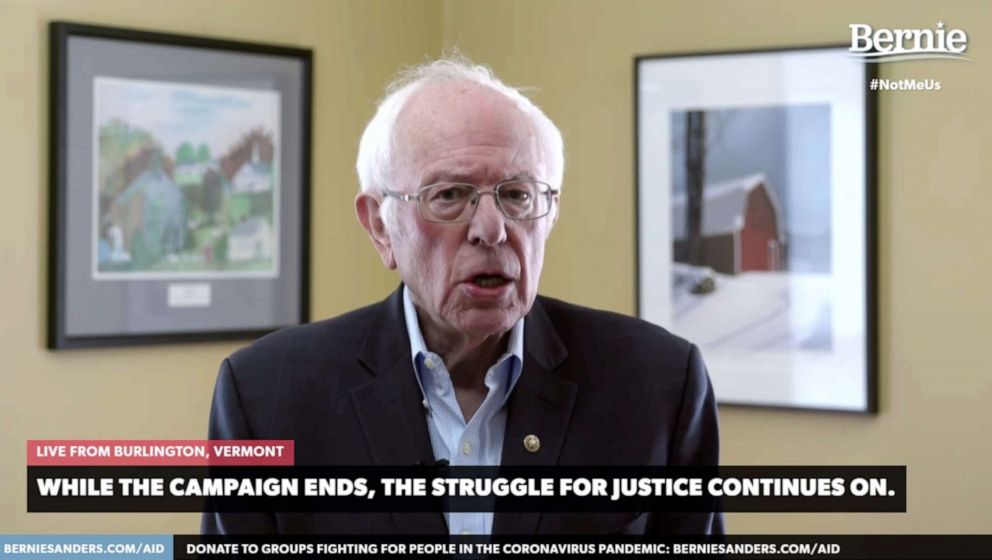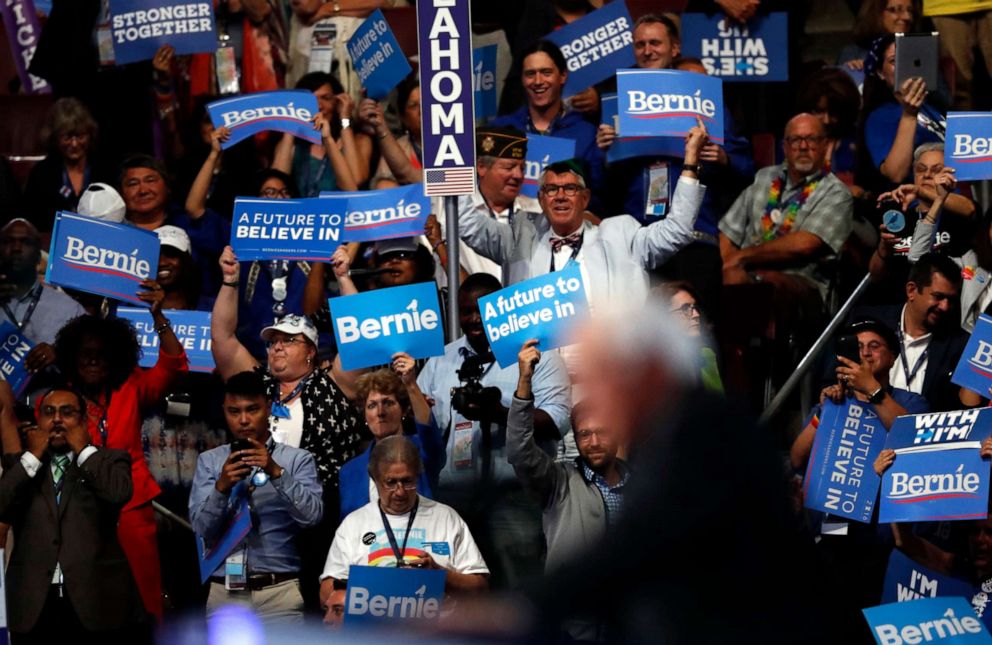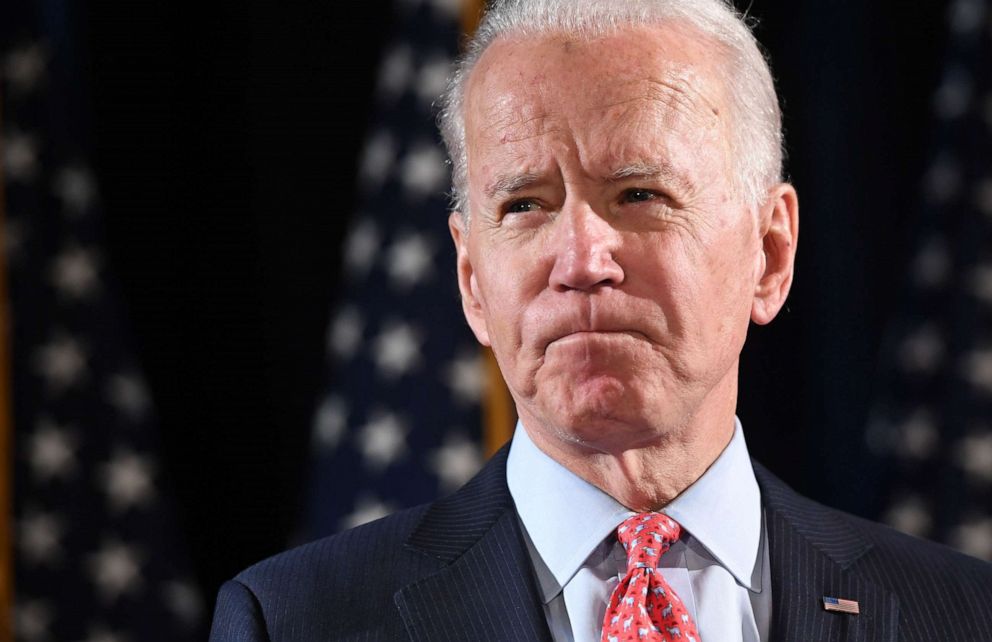Sanders seeks influence, Biden eyes party unity as delegate battle emerges post-primary
"I will stay on the ballot," Bernie Sanders said before dropping out of race.
The effective end of the Democratic primary – with the exit of Vermont Sen. Bernie Sanders in early April – set off the start of negotiations between the party’s presumptive nominee and the de-facto leader of the progressive movement to determine the bounds of Sanders' influence over the party’s platform, as he continues his push to corral delegates in the remaining primary contests.
It’s not entirely clear what substantive concessions the Sanders camp is seeking from former Vice President Joe Biden, who – as the presumptive nominee – will hold wide sway over the platform and messaging out of the Democratic National Convention.
But Sanders and his allies are hoping to secure leverage at the convention by continuing to amass delegates. Those delegates could serve as bargaining chips down the line, with just the threat of messy roll-call votes potentially being used to enshrine Sanders' priorities in areas of policy and process moving forward.
But mathematically and politically, Sanders is not in the same position he once was in 2016. This cycle, he won far less contests than he did in 2016, he is holding onto a smaller share of the delegates, and he already endorsed the presumptive nominee. His effort to continue to collect delegates, at least in the eyes of some Democrats, appears fruitless, particularly ahead of the general election fight with President Donald Trump.
"You lose all of your leverage to stay on the ballot when you endorse another candidate in the race. Even more so if there's a pandemic," Stu Loeser, a longtime aide to former New York City Mayor and 2020 presidential contender, Mike Bloomberg, tweeted. "Bernie endorsed Biden. That means he wants Biden to be President and any other votes are symbolic."
On April 8, when Sanders announced the suspension of his presidential campaign, he made an unusual vow to stay on the ballot in all upcoming contests to continue his delegate hunt and maintain his grip on any leverage he has accumulated over the course of two presidential bids to influence the party at the convention in August.
"I will stay on the ballot in all remaining states and continue to gather delegates. While Vice President Biden will be the nominee, we must continue working to assemble as many delegates as possible at the Democratic Convention, where we will be able to exert significant influence over the party platform and other functions," he told supporters via livestream from his home in Burlington, Vermont.

Seeking to head off the divisiveness that defined his relationship with the party’s 2016 presidential nominee, former Secretary of State Hillary Clinton, Sanders endorsed Biden the week after his departure from the race, the two men hashing out policy differences and challenging each other to a game of chess via livestream.
But even prior to Sanders’ official endorsement, Biden and his team began an outreach campaign that included a mild embrace of some more progressive policies like lowering the Medicare eligibility age to 60 and expanding his support for various student debt forgiveness policies.
The move by the Biden campaign, an early olive branch to his former chief rival, is a sharp departure from the bitter divisions that fueled the 2016 contest, with open fissures between Sanders and then-candidate Clinton on display through the Philadelphia convention.
Even at the convention, a raucous group of Sanders' supporters booed from the convention floor, disrupting the signature event in the presidential election cycle -- underscoring the party’s struggle to unify behind the Democratic nominee in the first matchup against Trump.
Looking to avoid a repeat of the discord, and with an eye towards further unifying the party, Biden’s team is now engaged in talks with the Sanders campaign that would allow the Vermont senator to keep delegates he would have otherwise had to forfeit due to his departure from the race.
"We feel strongly that it is in the best interest of the party to ensure that the Sanders campaign receives statewide delegates to reflect the work that they have done to contribute to the movement that will beat Donald Trump this fall. We are in discussion with them now on how to best accomplish that," a Biden campaign aide told ABC News this week.
Other top Democrats agree that the move signals the Biden campaign’s recognition that it needs the robust support of Sanders’ coalition if it wants to successfully unseat Trump in November.
"I don't know if it's necessary, but that's not the point. The point is that Sanders has a significant constituency, who look to him for leadership, and look to the folks around him for leadership, and that deserves to be respected just as it was in '16," Addisu Demissie, who managed New Jersey Sen. Cory Booker’s 2020 presidential campaign and was Clinton’s national voter outreach director in 2016, told ABC News. "Anything that it takes to bring us together to take on Donald Trump, I'm for. And if that's one of the things that will bring Sanders and his folks deeply into the fold. Then, we should do it."
The Sanders campaign did not respond to questions about any potential deal.

Sanders' plan to appear on any forthcoming ballots appears to be a backstop to the ongoing talks, with some of his supporters actively engaged in get-out-the-vote efforts in states with primaries still outstanding such as Maryland, New Jersey, Ohio and Pennsylvania.
But on Monday, Sanders faced a significant hurdle: New York election officials voted to strike Sanders' name from the upcoming June primary ballot in a unanimous vote, effectively cancelling the state's Democratic presidential primary and thwarting his plans.
An attorney for the Sanders campaign wrote a letter to the commission challenging any attempt to omit his name from the ballot, arguing it would further sow discord within a party desperately seeking unity.
"His involuntary erasure from the ballot, on grounds of a law that was not in effect when he announced his campaign’s limited suspension, would sow needless strife and distrust, impeding Senator Sanders’ efforts to unify the Democratic Party in advance of November elections," the letter reads.
Prior to the Sanders campaign’s intervention, outside forces were taking the lead to maintain Sanders' influence. Our Revolution, the nonprofit spun-off from Sanders' 2016 campaign, circulated a petition and began working Sunday with volunteers to phone-bank and text New York state officials to lobby for the senator's name to remain.
After the vote, which only involved the two Democratic commissioners on the New York State Board of Elections, Jeff Weaver, a senior advisor on the Sanders campaign, called the decision an "outrage" and pointed out that Biden’s campaign never asked for the vote to be taken up - reflective of the senator's delicate balancing act between appeasing both his liberal base who are eager to see him keep up the progressive fight, and the party in order to maintain an ability to attempt to reform it.
Weaver also warned that the move sets a dangerous "precedent" for November’s general election, before adding that the Vermont senator and the progressive movement is being robbed of an opportunity to eventually influence the party's platform and rules at the convention.
"Today’s decision by the State of New York Board of Elections is an outrage, a blow to American democracy, and must be overturned by the DNC," he said. "If this is not remedied, New York should lose all its delegates to the 2020 Democratic National Convention."
Sanders’ allies, too, ripped into state election officials for the unilateral action, with Larry Cohen, a DNC member and the board chair of Our Revolution, asserting, "We will be forced to go to the credentials committee and challenge any delegates that New York sends to the convention."
Another progressive ally, Yvette Simpson, CEO of Democracy for America, a group that was instrumental in backing Sanders’ 2016 campaign, signaled her aversion to taking Sanders' name off any ballot.
"The challenge with not having the presidential primary is that we do worry about turnout going down," she told ABC News in an interview last week ahead of the state board of elections’ decision. "We already have a nominee but in every single one of these states, we've got folks running in district races for Congress, we've got folks running for statewide races, we've got folks running for local races and all those races still need people to vote for them."
A spokesperson for the Democratic National Committee noted that the decision will come under the review of the national party’s powerful rules committee.
"Any substantive change to a state's first determining step in allocating delegates like this one will need to be reviewed by the DNC's Rules and By-Laws Committee," David Bergstein, a spokesperson for the DNC, said. "Once the state party submits an updated delegate selection plan, the committee will review that plan and make a determination."

But Sanders’ supporters aren’t slowing down, publicly identifying components of Biden's platform they wish to alter, including climate change and criminal justice proposals, and even the health care and education plans the former vice president already amended so as to be more palatable to the left.
Such a blueprint was set by the senator himself in March, prior to the suspension of his campaign when he responded to Biden's sudden call for free college tuition for students whose families fall below specified income thresholds.
"It's great that Joe Biden is now supporting a position that was in the Democratic platform four years ago. Now we have to go much further," Sanders said in a statement. "We need to make all public universities, colleges and trade schools tuition-free for everyone like our high schools are."
Later, when the Biden campaign announced its support for lowering the Medicare eligibility age to 60, Sanders staffers piled on via social media, mockingly suggesting the campaign cross-out the "6" in "60," so as to support Medicare for All.
At the center of the parrying between the two camps is Sanders’ ability to hold onto his share of the delegate prize. As of Monday, Biden is leading the delegate race over Sanders 1,300 to 941.
While delegates are technically pledged, they are not legally bound, and if a candidate drops out of the contest before the delegates are elected at state conventions, a candidates' statewide delegates, roughly 35% of the delegate pool, are reallocated proportionally under party rules to any viable candidate still running - in this case, only Biden.
The remaining 65% of pledged delegates are allocated based on district-level results, and are tied to a candidate through the convention.
Keeping his placement on the ballot in New York devolved into a brawl since the state’s delegate trove stands at 274, marking one of the most delegate-rich states behind California. Driving Sanders’ mission is the goal of earning enough delegates to score 25% of seats at the table on each of the three standing committees at the Democratic convention in order to ensure he has influence over the party's policy platform and rules.
With Sanders' supporters and allies comprising one quarter of each convention committee’s members, his key backers will have enough support to author a minority report that can then be forced out of the committee for a full vote on the convention floor, along with the majority report.
Without New York’s delegates in play, and as the coronavirus – which was a looming factor that contributed to the commission’s decision – upends the entire electoral process, Sanders’ road to achieving that goal is now far tougher.
ABC News’ Meg Cunningham and Quinn Scanlan contributed to this report.




